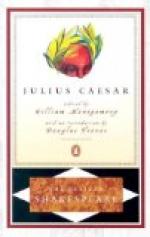|
This section contains 6,201 words (approx. 21 pages at 300 words per page) |

|
SOURCE: “Julius Caesar and ‘Dramatic Coquetry,’” in Shakespeare and the Mannerist Tradition: A Reading of Five Problem Plays, Cambridge University Press, 1995, pp. 72-86.
In the following essay, Maquerlot evaluates Julius Caesar as a Mannerist drama fraught with ambiguity, and contends that Shakespeare constantly altered audience sympathies toward Caesar.
In the second volume of his book on Shakespeare's histories, Professor Paul Bacquet rightly insists on the pedagogical function of the Chorus in Henry V. The role of the Chorus, he argues, is more systematically developed in this play than in any other of the same period, and serves to guide the spectators through the play's various episodes and also to encourage them to perform an act of ‘collective imagination’ without which there would be no dramatic illusion.1
It seems to me that the Chorus' repeated plea to the audience to compensate mentally for the material limitations of stage production...
|
This section contains 6,201 words (approx. 21 pages at 300 words per page) |

|


